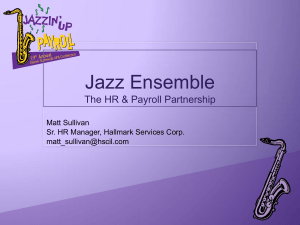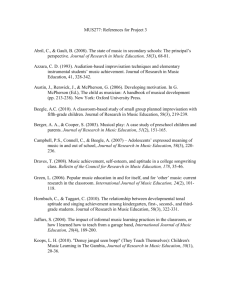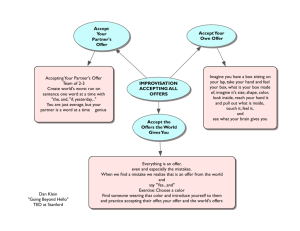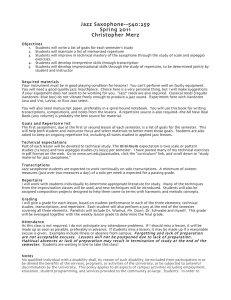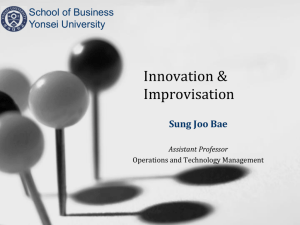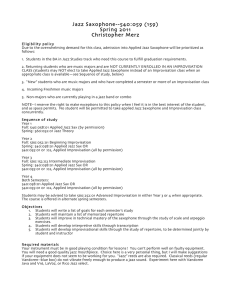Applied Improvisation Spring 2011 Christopher Merz
advertisement
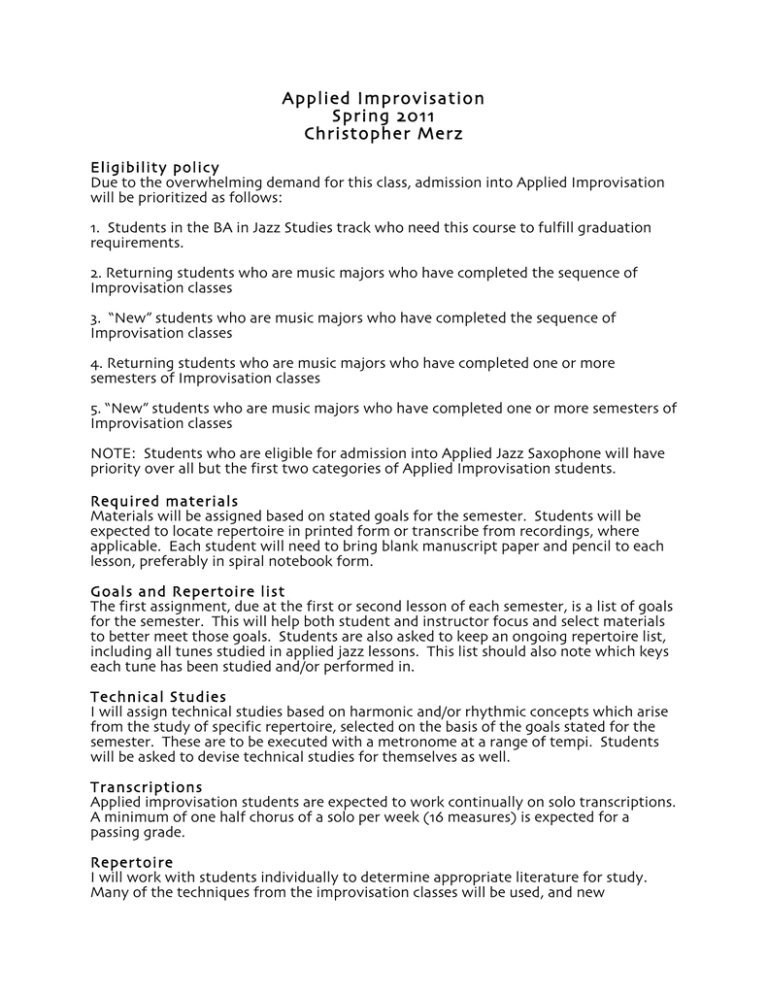
Applied Improvisation Spring 2011 Christopher Merz Eligibility policy Due to the overwhelming demand for this class, admission into Applied Improvisation will be prioritized as follows: 1. Students in the BA in Jazz Studies track who need this course to fulfill graduation requirements. 2. Returning students who are music majors who have completed the sequence of Improvisation classes 3. “New” students who are music majors who have completed the sequence of Improvisation classes 4. Returning students who are music majors who have completed one or more semesters of Improvisation classes 5. “New” students who are music majors who have completed one or more semesters of Improvisation classes NOTE: Students who are eligible for admission into Applied Jazz Saxophone will have priority over all but the first two categories of Applied Improvisation students. Required materials Materials will be assigned based on stated goals for the semester. Students will be expected to locate repertoire in printed form or transcribe from recordings, where applicable. Each student will need to bring blank manuscript paper and pencil to each lesson, preferably in spiral notebook form. Goals and Repertoire list The first assignment, due at the first or second lesson of each semester, is a list of goals for the semester. This will help both student and instructor focus and select materials to better meet those goals. Students are also asked to keep an ongoing repertoire list, including all tunes studied in applied jazz lessons. This list should also note which keys each tune has been studied and/or performed in. Technical Studies I will assign technical studies based on harmonic and/or rhythmic concepts which arise from the study of specific repertoire, selected on the basis of the goals stated for the semester. These are to be executed with a metronome at a range of tempi. Students will be asked to devise technical studies for themselves as well. Transcriptions Applied improvisation students are expected to work continually on solo transcriptions. A minimum of one half chorus of a solo per week (16 measures) is expected for a passing grade. Repertoire I will work with students individually to determine appropriate literature for study. Many of the techniques from the improvisation classes will be used, and new techniques will be introduced. Students will also be assigned composition projects which will help them come to terms with harmonic and melodic concepts. Grading I will give a grade for each lesson, based on student performance in each of the three elements; technical studies, transcriptions, and repertoire. Each student will also perform a jury at the end of the semester covering all three elements. This jury will be paneled by Dr. Washut, Mr. David Dunn, Mr. Bob Dunn and myself. This grade will be averaged together with the weekly lesson grade to determine the final grade. Attendance As this class is not required, I do not anticipate any attendance problems. If I should miss a lesson, it will be made up as soon as possible, preferably in advance. If students miss a lesson, it may be made up if a reasonable excuse is given. Examples include illness or absence from campus. Forgetting and lack of preparation are not acceptable excuses. Lessons will not be postponed or made up due to lack of preparation. Habitual absences may result in termination of study at the end of the semester. Students are waiting in line to take this class! Notes No qualified individual with a disability shall, by reason of such disability, be excluded from participation in or be denied the benefits of the services, programs, or activities of the University, or be subjected to unlawful discrimination by the University. This policy applies to all aspects of campus activities including employment, education, student programming, and services provided to the community at-large. Students: In order to receive assistance with requests for accommodations, a student with a disability must contact Student Disability Services, http://www.uni.edu/resources/disability. Cell phones are to be turned off or set to “silent” mode during lessons.
